The trouble with first impressions is that we can only make them once. Whether at a job interview or meeting your future in-laws, those people will almost always remember those initial impressions. The same is true when viewing a classic car as a potential restoration project. It is easy to overlook a candidate that exhibits tired paints and the unmistakable signs of rust. However, taking that approach with this 1969 Chevrolet Camaro SS 350 could be a mistake. When we look beyond the weathered and rusty exterior, we find a numbers-matching car that is structurally sound. What this vehicle needs more than anything is a new owner willing to put in the time and effort to return it to its former glory. Located in Ontario, California, you will find the Camaro listed for sale here on Craigslist. You could take this SS home by handing its owner $26,000. I once again need to say a big thank you to Barn Finder Pat L for spotting a promising project for us.
Dealing with the easy stuff first, it appears that this Camaro has been the recipient of a color change at some point. The owner includes a photo of the Cowl Tag, and it indicates a paint code consistent with Dover White with a Black vinyl top. It isn’t clear when the transformation occurred, but given the level of work we are about to discuss, reversing that change would not be difficult. Now, we need to address the elephant in the room. The Camaro has significantly more rust than I would expect to find in a vehicle of this type located in California. Still, there’s no knowing where else it may have resided. What makes the rust fascinating is its location. Finding it on the roof is no surprise because it commonly develops under vinyl due to deterioration of that material. There are also signs around the back window and areas in the trunk lid and taillight panels. However, the lack of issues in the lower extremities bode well for potential buyers. There may be a few spots visible in the lower rear quarter panels, but patches may address those problems. The remaining areas, like the lower front fenders, door corners, and rockers, look pretty clean. That is the tip of the iceberg because the seller indicates that the floors, frame, and trunk pan are rock solid. The only note of caution I would sound is that the interior shots reveal deterioration in the dash pad area where it meets the bottom of the windshield. This is a known rust trap and demands close inspection. Repairs are possible, but it is a time-consuming and fiddly process. The exterior trim condition ranges from good to restorable, while there are no problems with the glass.
Potential buyers with one eye on future values will be pleased to learn that this SS is a numbers-matching vehicle. It features a 350ci small-block V8 that sends its 300hp to the rear wheels via a three-speed Hydramatic transmission. Chevrolet offered faster versions of the Camaro SS in 1969, but this car’s ¼ mile ET of 15.2 seconds could hardly be considered shabby. Not only is this car’s drivetrain original, but the Camaro starts and runs. It will undoubtedly need some work to return it to a roadworthy state, and even if the motor is healthy, I won’t be surprised if the buyer pulls it to detail everything to a high level. Once again, this is a time-consuming job, but the sense of pride that the next owner would feel every time they lifted the hood would make it a worthwhile exercise.
One aspect of this project that may consume more time than money will be returning the interior to a respectable state. It appears that someone has treated the seats to a re-trim in a combination of cloth and vinyl, and they seem to be in good condition below the heavy layer of dust. The same is true of the console and dash, although there are aftermarket gauges, and the factory radio has gone bye-bye. One excellent addition that doesn’t surprise me in a car from this location is factory air conditioning. Its health isn’t clear, but having it working correctly would seem another aspect of the restoration that would be worth the cost and effort. The carpet looks tired, while the kick panels and door trims have been cut to house speakers. Replacement door trims generally sell for $540 per pair, while the kick panels add a further $220 to the tally. Throw in $240 for a carpet set, and if these prove to be the only significant investments, it could prove the cheapest part of this build.
I’m not going to sit here trying to convince you that returning this 1969 Camaro SS 350 to its factory best will be an easy task because the grinder and welder will work overtime whipping the panels into shape. However, the car appears to be structurally sound and houses a healthy drivetrain and interior. Fully restored, it is a classic that should command a market value of $40,000 any day of the week. If the next owner achieves perfection, that figure could easily climb beyond $50,000. Like many First Generation pony cars, values continue to rise relentlessly. That opens an intriguing scenario for potential buyers to consider. If the purchase price and restoration blow out beyond the figures I’ve mentioned, it could still be worth the cost and effort if they intend to retain the car long-term. With the ongoing increases, it may not take long to recoup those perceived losses, making this a potentially worthwhile investment. It’s a concept worth considering.
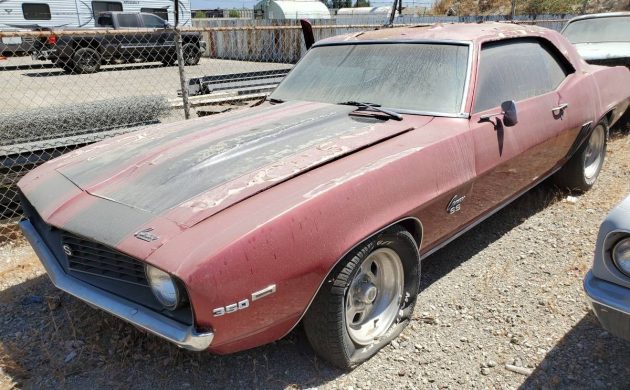
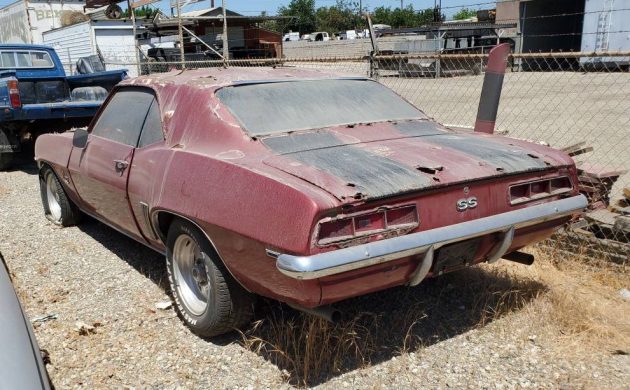
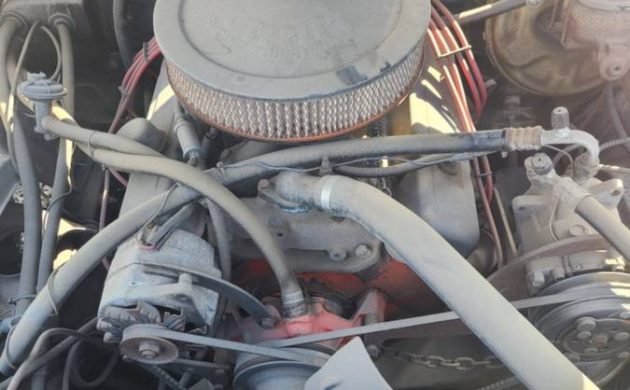
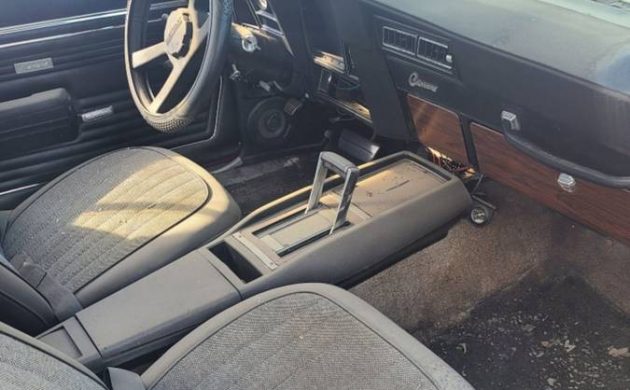
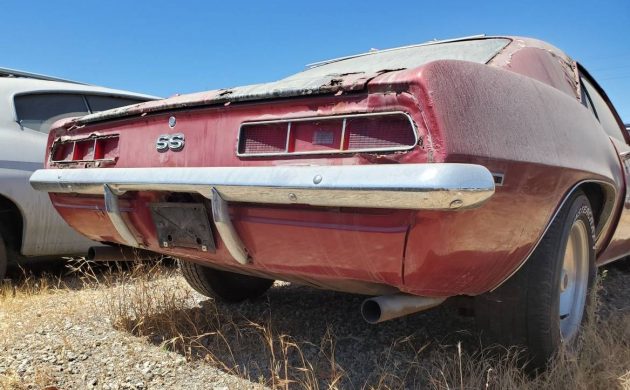


26 large and another (at least) 30 Large for resto?? You’d be under water right quick. Looker over good then decide. Good luck and happy motoring.
Cheers
GPC
I have a soft spot for ss350 cars. The weight and balance of a z/28 with a much more tractable engine, and a/c if you want it. A great overall package on a first gen.
This car has seen a lot of changes. The trim tag indicates it started life as a Dover White car (50) with a black vinyl top (B) and a standard black vinyl interior (711). It’s now red with a Black Houndstooth interior, and no vinyl top. X11 indicates that it could be a real SS350, but it could also be just a base Camaro with Style Trim Group, dressed up like an SS. There’s no mention if it’s the original engine, but considering all the other changes made to it, it’s probably not.
At first glance it looks like a decent car, but $26K is a lot of money for a car with so much rust, and needing so much work, to return it to stock/original.
The ad says it’s numbers matching, but 26K does seem high for a car needing this much metal work. Almost certainly will need floors, inner and outer rockers, and outer wheelhouses as well as what you can see in the pics. X11 without other docs will always leave doubt in some people’s minds about authenticity.
I just went back and read the ad again, and no where in it does the seller say that it’s “matching numbers”. All the ad says is “All Original” in the heading, and “Original Everything” in the description, which is obviously not true considering the color and interior change. With headers, aftermarket intake, valve covers, air cleaner and AC compressor, there’s not much there to identify as original under the hood.
It is interesting to see that the chain added to the left side of the engine during the 1971 engine mount recall, is still in place. I would hope anyone replacing the engine would have used the newer safety type mounts, so maybe it is the original engine?
Another grossly overused term; “all original”.
The steering wheel sure isn’t original, neither are the rims. 350 badges on the front fenders are mounted too low. And that’s just at a glance.
Run away from this one!
I only paid a thousand dollars for my 69 rs camaro , it had mint floors , frame and trunk but dented quarters, doors and fenders
I should have paid more to get more but had no extra money at the time
That was a few years ago , 1987 to be exact !
May or may not be factory air as the compressor is definitely aftermarket.
A lot of fishermen out there, don’t get hooked on this one
Since many of you are not well-versed on the ins and outs of buying cars from California, I will help you out here…
Chances are, as the buyer states, the underside of this car will be absolutely pristine. The problems this car has are not because it “resided in another state” previously, nor does it mean that “because it has rust up top, it means there is probably hidden rust underneath”.
The rust this car has is from sitting near the coast, where salt-water condensation sits on the top surfaces of the car. It will, likely, need an entire new roof, extensive front and rear window channel, tail panel, and trunk floor work (due to a leaky, dried-out trunk seal).
The rustiest car that I ever bought was a 1971 Dodge CHP Polara that had spent it’s entire life in Southern California but, after being sold and driven by a civilian for many years, it then sat in a storage yard near the coast, in Santa Barbara for several years. The underside was absolutely flawless…the roof was Swiss Cheese. It was fixed, eventually, but it took an entire roof from a low-mileage, Ohio car (believe it or not) that was pristine on top but, of course, rusted out on the bottom.
Good points! I’m trying to figure out how a recently worked on car could be so rusty on top. Trunks don’t rust out like that unless they are coastal cars.
With the amount of rework done with paint, interior, motor and AC Compressor work done, it appears to have sat for a long time.
BEware: Some of my projects have ended up costing more than a clean all original car.
Way too much work but rare automatic and factory A/C car.
gbvett62; GM did not use a chain for the recall. It was a kit with a bracket and two cables to go around the mounts. The main torque side was a thicker cable.
Last CJ; that is not factory A/C. It’s aftermarket installed using the astro ventilation ducts in the dash.
Not trying to bash anyone, just informing.
Dynacorn should put this car on the cover of their next catalog.